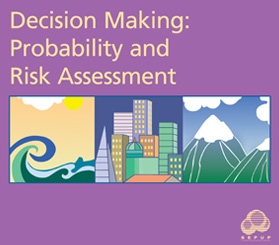Decision Making: Probability and Risk Assessment

This module focuses on how mathematical reasoning can be used to make decisions in everyday life. Marble-rolling activities, number cubes, and coin tosses are used to introduce probability. After reading historical case studies, students are presented with a hypothetical life-or-death scenario involving the spread of an infectious disease. They decide how to reduce risks associated with local disasters, whether they occur naturally or as a result of human intervention. Students are assessed on their ability to use evidence and identify trade-offs when making a decision.
Each module includes a Teacher’s Guide containing reproducible student pages and a kit containing the equipment required to conduct the activities with five classes of 32 students. The Teacher’s Guide provides specific strategies to facilitate and assess student learning.
Overview
Introduction
Module at a Glance
Guide to the Module
Activity 1: Estimating Probabilities
Student Investigation: Marble Mania
Activity 2: Surveying a Population
(Student Investigation: Creating a Survey)
Activity 3: Comparing Risks of Injury
Student Investigation: Rank the Risks
Activity 4: Evaluating Evidence of Risk
Student Investigation: Check the Evidence
Activity 5: Risk Analysis and Reduction
Student Investigation: Reduce the Risk
Activity 6: Analyzing Survey Data
Student Investigation: What Does Your Survey Show?
Activity 7: Investigating Chance and Probability
Student Investigation: Heads or Tails?
Activity 8: Making Decisions With Limited Evidence
Student Investigation: The Injection Problem
Activity 9: Quantitative Risk Analysis
Student Investigation: The Smallpox Story
Activity 10: Investigating Cumulative Risk
Student Investigation: Roll Again!
Activity 11: Risk Mitigation
Student Investigation: Be Prepared!
Appendix A: Materials
Appendix B: Background
Appendix C: Assessment
Appendix D: Glossary

